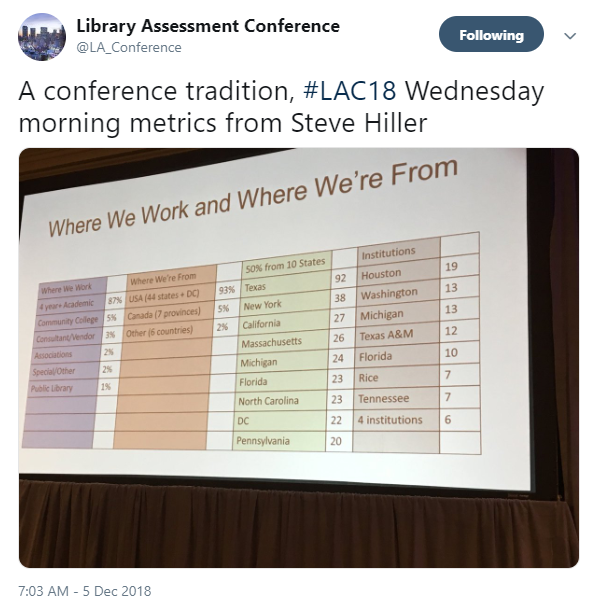Learning at LAC
Notes from the Library Assessment Conference 2018
This year, the Association of Research Libraries and the University of Washington Libraries hosted their biennial Library Assessment Conference (LAC) in Houston, Texas. Having recently joined the Ithaka S+R survey team in November, this was my first time attending LAC, and I was eager to immerse myself in the sessions described in the schedule.
I knew I was in the right place when the conference started with “Wednesday Metrics with Steve.” Steve Hiller’s comical yet informative approach to discussing the demographic breakdown of attendees as well as how attendees’ registration fees were utilized was definitely within the spirit of a group of assessment professionals. This was such an effective way of fostering an atmosphere of both belonging and transparency from the very beginning of the conference.
The first keynote speaker, Paul Jervis Heath of Modern Human, set the tone for the rest of the conference with his talk on approaching the design of library space through human-centered ethnography and his discussion of the Protolib Project. His takeaway of high, medium, and low intensity spaces in libraries (as well as his lost in translation mention of “pot plants”-turned joke) soon exploded on Twitter under the conference’s hashtag of #LAC18.
Following the #LAC18 hashtag was crucial to my experience at the conference. The vivid discussions that took place between tweets helped to provide a more holistic experience–both for those attending in person as well as those who were following along online–especially as so many interesting sessions were happening concurrently. It was great to follow along on Twitter during the informative Ithaka S+R’s Local Surveys session, which focused on the experiences of past participants and their various analytical approaches to their respective survey results including what modules were used, how the data were distributed to administration, faculty, and students, as well as tools for further analysis, while also occasionally dipping into topics discussed in the other three sessions across the hallway. The live-tweeting of important slides and quotes from the presenters, as well as attendees’ own reflections and questions contributed to a virtual conversation among all that had access to the conference hashtag.
As my colleagues Christine Wolff-Eisenberg and Danielle Cooper described in their blog post about LAC, the conference included several sessions on key topics, including determining the needs of important, diverse communities (such as first generation college students, minority-status students, adjunct faculty, etc.), informing strategic directions, and articulating the value of the library in relation to institutional goals. User privacy and ethics in the age of big data transcended discussions across many of the sessions. In Human Subject-Based Library Research and Professional Ethics: A Panel Discussion, the panelists Lisa Hinchliffe, Robert Farrell, Laura Spears, and Stanley Wilder focused on the library’s role in protecting patron privacy, how to conduct ethical assessment and research, and whether the profession needs to develop a new code of ethics or guidelines. They concluded that while a new code of ethics is not particularly necessary (as there are many inter-disciplinary codes of ethics to abide by, specifically by the presiding institution), there should be more information provided to students to make them more aware of what specific data they are providing when participating in research (for example, providing identification numbers when completing a survey). I suspect that issues related to user privacy, diversity, inclusion, and equity in library space and assessment, as well as incorporating long-term student success goals within assessment practices and improving information literacy will be of much debate and discussion at the next LAC.
I would also hope to see more community college and public library representation in the future. While a only a small bunch at this year’s LAC (only five percent of attendees were from community colleges and one percent from public libraries), their contributions were so necessary in helping provide a more holistic perspective on important topics including student success and the value of the library. Faith Bradham’s presentation, Impacting Student Success: A Practical Guide to Assessing Library Services at the Community College Level, expressed how vital the library and related services are to the community college student and provided an assessment method for other community colleges to use. Emily Daly’s presentation, 1G Needs are Student’s Needs, clearly articulated how crucial it is to understand the contextual aspects surrounding the differences between first generation college students and continuing generation students while also recognizing that addressing first generation students’ needs ultimately would benefit students more broadly. This notion was emphasized further by my colleague Christine Wolff-Eisenberg and Braddlee from Northern Virginia Community College in their Community College Libraries & Academic Support for Student Success presentation which indicated that community college students’ needs often emerge from the intersection of personal and academic problems, which can also be the case for four-year college students. The future of library assessment seems to be progressing towards an intersectional approach and perspective which will be needed in order to succeed and ultimately provide value to all students.
Even with an audience of 600 people, there was still a strong sense of community throughout the conference. I found my LAC18 experience to be one filled with interesting conversations and insight into a growing and dedicated field, made up of individuals who find value in data collection and analysis as much as I do, and whose mission is to improve the value of their services, spaces, and collections while fostering a sense of inclusion. This common focus united the conference with a purpose and the conference organizers also achieved a real sense of inclusion within the conference itself. I am very much looking forward to 2020.
